- Home
- Maggie Stiefvater
Call Down the Hawk Page 10
Call Down the Hawk Read online
Page 10
“It burned down,” Declan lied smoothly, without a pause. “Vandals, while we were away at school.”
Angie’s face turned tragic. “You boys have had more than your fair share of bad news. You’re like a podcast. Look at you. Tragedy. What brings you back? You here like everyone else, to see if you can catch a glimpse of him before they bring him in?”
“Him?”
She leaned across the counter, all of her spilling against the drawstring closure. In a stage whisper, she said, “He’s breaking the rules, they said. On the wrong side of everything. Doesn’t care about the rules out there or the rules in here. Just does what he wants. They say he’s here because there’s law here and we all know how we feel about that.”
Declan said, “Who?”
Angie patted his cheek. “You always did want answers.”
Annoyance briefly broke through Declan’s features before being replaced with his neutral expression again. “We’d better go. Time’s money.”
It was always a good time, Ronan thought, to trot out a Declanism.
“Watch out for the po-po,” Angie said.
Declan was already turning away. “I’ll do that.”
As the Lynch brothers retreated down a long red hallway, Ronan asked, “Does she help run this?”
“Angie? Why would you think that?”
“She was behind the desk.”
“She was probably seeing if she could get cash from the drawers. Do you have the keycard? We’ll need it to get into the elevator.”
This was dreamlike, too, this casual admission of her criminality, said in the same bland tone Declan said everything. But this used to be Declan’s world, Ronan reminded himself. Before the gray town house, before the gray suit, before gray tone of voice, before invisibility, before their father’s murder, Declan Lynch came to these often enough to be recognized.
Sometimes Ronan wasn’t sure he knew any of his family.
The elevator doors at the end of the hall were like a gateway to an otherworld: brass and glimmering and surrounded by an elaborately carved frame, set like a jewel in the blood-red wall.
Declan swiped the keycard in the elevator’s reader and the doors hissed open, revealing mirrored sides. The brothers, outside, looked at the brothers, inside. Declan, with his good boring suit and Niall Lynch’s nose and curled dark hair. Ronan, with his shaved head and his tattoo creeping out of his collar and Niall Lynch’s mouth and nose and eyes and chin and build and dream ability and everything else. Unmistakably Niall Lynch’s sons, unmistakably brothers.
They stepped in.
“Up we go,” said Declan.
Jordan sat in her car in the Carter parking lot. It was only dumb luck that she’d found a spot there, one last circle round through the cars, telling herself that if she was meant to find a spot there would be one, and there it was.
She was late, but she took a moment anyway, because she was having one of her episodes.
Jordan didn’t dream when she slept—she didn’t think any of Hennessy’s dreamed girls did—but when this feeling started, she thought she knew what it must feel like. Her thoughts pulsed with slightly wrong memories and places she had never been and people she had never met. If she didn’t stay focused, those daydreams would seem as important as reality. She’d find herself breathing in time with a pulse outside herself. If she didn’t focus, she’d find herself heading toward the Potomac, or just due west. Once she’d come back to herself and found she’d driven two hours to the Blue Ridge Mountains.
It had taken all of her concentration to get to the Carter.
Please pass, she thought. Not tonight. Tonight’s not a good time.
She forced herself to be in the moment by considering how she would re-create the view before her on canvas. The big, square Carter Hotel looked like a dollhouse made out of a moving box, its tiny windows alight with a yellow glow, silhouettes moving festively in them. It would be easy to render the scene charming, but really, everything here had an edge. Dark, dead leaves heaved restlessly in front of the exterior lights. The sidewalks were apocalyptically empty. For every cozily lit window was a shrouded window. Statistically, someone behind one of them was getting hurt.
She felt a little more grounded—or at least the real world felt truer than the hazy ghost world of the episode. As she finally climbed out, her phone rang.
“Where are you, bitch?” Hennessy’s amiable voice was distorted on the other end of the line.
“Just parked.”
As Jordan opened the Supra’s tailgate, Hennessy launched into a profane pep talk. Jordan gathered her supplies. Three canvases, her sealed palette, her brushes, her turp. Two of the canvases meant nothing to her—they were just another day at the office. The third, which she would be handing off to one of the girls as soon as she got inside, was everything. It was everything.
How good are we? she asked herself.
She slid it all out.
The best.
She shut the tailgate on her doubts.
Stepped away.
“… shell game where every shell is turned over at the same time,” Hennessy concluded.
“I was just thinking shell game,” Jordan said.
“Great minds.”
“Okay, mate. I’m headed in.”
“Balls out.” Hennessy hung up.
The doorman, smoking, watched her cross the lot to him. Not rudely, not salaciously. Just with interest. Even with large parcels tucked under one arm, she had a walk that seemed like there should be a slow-motion explosion occurring behind her. She would watch herself, too, if she wasn’t herself.
But it probably had less to do with that and more to do with the fact that he would have seen several other versions of her already that night, all dressed exactly the same, down to the last hair on their heads. One to keep watch. One to distract. One to steal. One to replace. One to be an alibi. Only June waited somewhere in the lot. She had to be the getaway driver—she’d straightened her hair to get that bank job and couldn’t look convincingly like Hennessy anymore without a hat. Jordan appreciated the sentiment, the small gesture of individuality, but it sure was a pain in the ass.
Jordan stepped up to the doorman. She hoped none of the other girls had chatted him up or made small talk that she would need to remember. They were good at this, she reminded herself, being each other, being forgeries of Hennessy. They would have texted her if she needed to know something to be convincing. Be casual. Be Hennessy. “What’s cooking, friend?”
He offered her his cigarette in response. She accepted it, took an inhale as he watched her, and breathed it out into the cold night. She wanted another mouthful, but she had quit six months ago, so she handed it back to him. Hennessy had informed Jordan that she had an addictive personality, and maybe she did.
“Thanks, mate,” she said.
“Forgot something?” he asked.
“Needed a top up on the ol’ victuals. Supplies ran low. The troops were hungry.”
“You know I have to ask.”
“You know I’ve got an answer.” She reached into her jacket—casual, be casual—and handed him the linen handkerchief. She’d forged four copies of Breck’s invite with JORDAN HENNESSY. It had taken ages. Her hand was aching by the end, so Hennessy had stepped in and done the last one. It was impossible to know which of the girls had Hennessy’s forgery and which had Jordan’s. Even Jordan couldn’t tell.
He studied it.
She held her breath.
He was looking at the edge of the handkerchief, which she had carefully frayed to match all the others he had seen the girls use.
Now he eyed her. The septum ring; the scrubby ponytail; the floral tattoo ringing her throat; the crocheted corset beneath the leather jacket; the fingers covered with rings and more floral tattoos; the wide and perfect smile that almost certainly was amused at your expense. Hennessy’s style. Which made it Jordan’s, too.
Both the invite and Jordan were flawless copies.
&nb
sp; The doorman handed the handkerchief back to her.
He said, “Welcome back.”
She was in.
When Ronan was young and didn’t know any better, he thought everyone was like him. He made rules for humanity based upon observation, his idea of the truth only as broad as his world was. Everyone must sleep and eat. Everyone has hands, feet. Everyone’s skin is sensitive; no one’s hair is. Everyone whispers to hide and shouts to be heard. Everyone has pale skin and blue eyes, every man has long dark hair, every woman has long golden hair. Every child knows the stories of Irish heroes, every mother knows songs about weaver women and lonely boatmen. Every house is surrounded by secret fields and ancient barns, every pasture is watched by blue mountains, every narrow drive leads to a hidden world. Everyone sometimes wakes with their dreams still gripped in their hands.
Then he crept out of childhood, and suddenly the uniqueness of experience unveiled itself. Not all fathers are wild, charming schemers, wiry, far-eyed gods; and not all mothers are dulcet, soft-spoken friends, patient as buds in spring. There are people who don’t care about cars and there are people who like to live in cities. Some families do not have older and younger brothers; some families don’t have brothers at all. Most men do not go to Mass every Sunday and most men do not fall in love with other men. And no one brings dreams to life. No one brings dreams to life. No one brings dreams to life.
These were the things that made Ronan Lynch himself, but he didn’t realize it until he met the rest of the world.
The Fairy Market didn’t truly begin for Ronan until the brothers stepped out of the elevator and into another red hallway. They passed a very tall black man who looked as if he was talking into a phone but whose mouth was making no sound. A very old white woman, buckled around a rolling suitcase that dripped liquid as she went. A pair of deeply bronzed women who seemed like they ought to be selling makeup strolling with arms linked, laughing. None of them bothered to hide their stares.
This was so like a dream. All this time, places like this had existed, and Ronan had been shuffling across tidily paved parking lots and blinking underneath a suburban sun. He didn’t know if he belonged here, but he suspected he belonged here more than in the world where he’d been hiding. Declan must’ve known it, too, but he hadn’t told him. His father must have known it, but he hadn’t told him, either.
Ronan had been raised in an ordinary nest and made to feel like he had no kin.
“Don’t talk to anyone about Dad,” Declan said to Ronan in a low voice. “People knew him here. As a collector, not as a dreamer. They thought he found all the stuff he sold. Don’t give them any other ideas. Don’t—”
“Do I look like I’m gonna chitchat?” Ronan asked.
Declan eyed himself in a mirror as they passed. Ronan looked at him, too. He watched his brother’s reflection square his shoulders. He watched his brother’s reflection mouth: Don’t make me regret this.
They came to the first door. Declan swiped the keycard; the door hummed.
Ronan remembered, all of a sudden, one of the first things Bryde had told him:
You are made of dreams and this world is not for you.
They plunged into the arcane.
Room one: textiles. It was a typical hotel room: two queen beds, high-sheen comforters, big mirror on one wall, flat screen on the other. But it was also a bazaar, a shop stall. Rugs were draped over the beds and curled into Fibonacci spirals on the floor. Sheer scarves hung from the golden curtain rods. A tattered wall-hanging covered most of the flat screen. Two men with deeply lined skin eyed the brothers as they entered. One was eating bright yellow rice from a take-out container. The other was playing on his phone.
Ronan wasn’t sure what he expected of a mythological underground market, but it wasn’t rugs.
One of the men said, “Declan.”
Declan shook hands with him, familiarly, like bros. “Heydar.”
How many people here knew Declan?
As the two of them conversed in low murmurs, the other guy offered Ronan some kind of patterned cookie. Ronan shook his head.
“For a hot moment I thought they were talking about your father,” Heydar was saying. “Everyone’s talking about it.”
“Who?” Declan asked.
“‘Him,’ ‘him,’ all this talk about a man with incredible things, leading them on a merry chase after that thing in Ireland.”
Declan said again, “Who?”
Heydar shrugged. He looked past Declan at Ronan. “Your brother is Niall’s son for sure.”
Declan’s expression changed. From one blank expression to another, blanker one. He’d always seemed annoyed that Ronan looked so much like their father. “I want eighty-four for paintings, right?”
“Eighty-four or two-Y,” Heydar said. He was still looking at Ronan. “Makes you miss the bastard, doesn’t it?”
“I’m used to it,” Declan said. “Hey, give me a call when you’re in town next.”
In the hall, Ronan waited until the door fell closed and then demanded, “Rugs?”
“Stolen,” Declan said. “Or looted from archaeological sites.”
“Is it all going to be this boring?”
Declan said, “I hope so.”
Room two: mechanical masks. Most of the light came from a collection of candles flickering in front of the black TV. The masks each had glass eyeballs fixed into them and what looked like real animal fur attached to human facial structures. Dozens of empty eyeholes gazed at nothing. Animal skins were stretched on tenterhooks on the walls between them, shaped like agony. Zebra stripes, endangered spots, ivory white and sharkskin gray; the whole place smelled like things that had been alive recently. This room was busy; they had to shoulder in to fit among the lookers.
Declan made a beeline for a collection of frames in the corner. Ronan stayed put; he didn’t want to get any closer to the masks. It all reminded him unpleasantly of the murder crabs, which reminded him unpleasantly of Harvard. He held his breath to keep from taking in any more of the dead animal stench.
A hand gripped his upper arm.
A tall white woman with a dopamine tremor looked down at him. She seemed like she should be teaching arithmetic instead of standing in a room of masks, her hair stretched into a bun, tight as those skins on their tenterhooks, her blouse buttoned all the way up to her chin, a bow tie knotted at her throat.
“Back again?” she asked.
Ronan attempted to pull himself free, but her fingers were long enough to wrap all the way around his bicep. He could’ve forced the issue, but she was strong enough that he’d knock into the assembled people behind him if he jerked harder. “Uh, wrong number, lady. Please hang up and dial again.”
“She doesn’t make mistakes,” said another woman, turning from the masks. Ronan blinked—she looked the same as the woman holding his arm. Then he realized there were subtle differences: longer nose, more pronounced crow’s-feet, deeper eye sockets. Sisters, one older than the other. She leaned in to Ronan. “Do any of these masks look back at you? If they look back at you, they’re meant to be yours.”
“You wouldn’t have come back if they didn’t look at you,” said the first woman.
He twisted his arm again. “I didn’t come back.”
“So you’re already wearing a mask, then,” said the second woman. “Who are you really?”
This felt like a dream, too, only in a dream, he’d be able to change the contents. Here he was only as powerful as his physical waking body.
Ronan wrenched himself free. The sisters laughed as he backed away.
When Declan took his arm a moment later, he flinched.
“Stop horsing around,” Declan said, turning him to propel him through the crowd. Before Ronan could protest this, Declan added in a low voice, “They’re talking about that guy in here, too. The one Angie and Heydar were talking about. Him.”
Say it, Ronan thought. Say Bryde.
Room three, room four, room five. Room six, seven, ei
ght, nine: They saw stolen art, jeweled dresses, rooms striped with blood, more endangered species hanging on walls, jewelry from dead people’s collections. Guns. Lots of guns. Poisons, too, and drugs. They swiped one door open and on the other side of it a man had his hands around a woman’s throat. The woman’s eyes were wide and veins bulging, but when she saw the brothers watching she mouthed GO AWAY. There was something terrible about the scene, in the complicity of it, in the way the woman was not saving herself, in the way they couldn’t tell if she was the client or the product. Ronan let the door fall shut, but he knew from experience when he’d seen an image that would haunt him again in dreams.
As they passed through one room, a fortune-teller with a visible third eye tattooed over her invisible third eye said to Ronan, “Twenty dollars, final offer, your future,” as if Ronan had already begun a negotiation with her.
“I’ve already got one,” Ronan said.
“Do you?”
“Ronan,” Declan said. “Come on.”
“Lynch boy!” A man leaning on a cane beside a box of other boxes recognized Declan. “Have you seen him? Have you seen him run?”
Declan, all business, just twitched his fingers dismissively as he passed, but Ronan paused.
“Who?” Ronan asked. “Tell me. Don’t play.”
The old man gestured him closer in order to whisper in his ear. He smelled of garlic and something sweeter and something fouler, reminiscent of the odor of Gasoline the vanishing boar.
Declan had stopped, looking over his shoulder at Ronan, eyes narrowed. He didn’t know what was going on, but he didn’t like it, probably because he didn’t know what was going on.
“I want his name,” Ronan said.
You’re wondering if this is real.
Say it, thought Ronan.
The old man whispered, “Bryde.”
Room ten: This was a top-floor library, a holdover from a far earlier era. The room was very long and very thin, dark and close, one side lined with dark bookshelves, the other with deeply red-and-gold wallpaper that matched the deeply red-and-gold carpet. Dusty crystals gleamed dimly in low-hanging chandeliers, like insects caught in spiderwebs. Art was everywhere: hanging on the walls, piled against harpsichords and pianos in the middle of the room. Music played from somewhere, some sort of sloping, uncanny reed instrument.

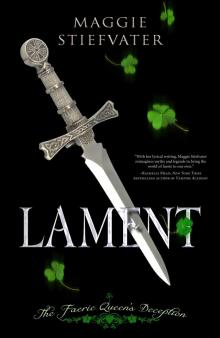 Lament: The Faerie Queens Deception
Lament: The Faerie Queens Deception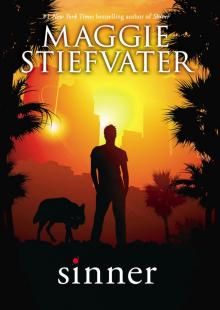 Sinner
Sinner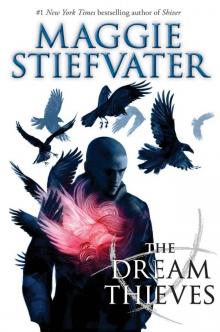 The Dream Thieves
The Dream Thieves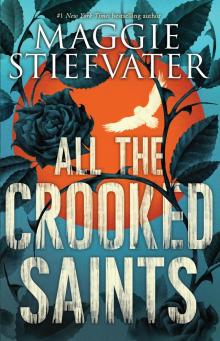 All the Crooked Saints
All the Crooked Saints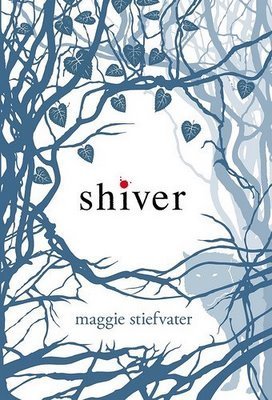 Shiver
Shiver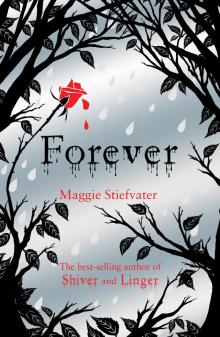 Forever
Forever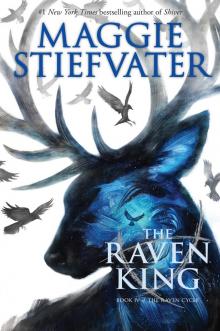 The Raven King
The Raven King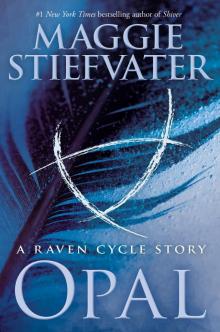 Opal
Opal Linger
Linger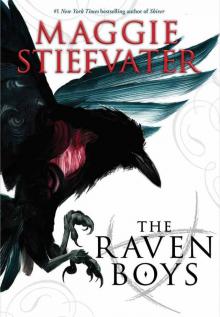 The Raven Boys
The Raven Boys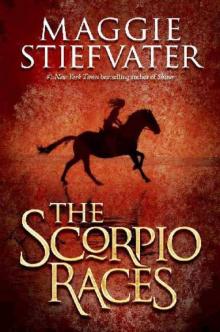 The Scorpio Races
The Scorpio Races Hunted
Hunted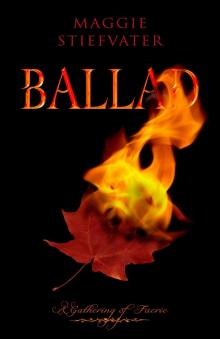 Ballad: A Gathering of Faerie
Ballad: A Gathering of Faerie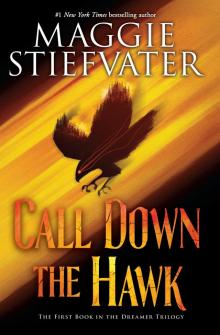 Call Down the Hawk
Call Down the Hawk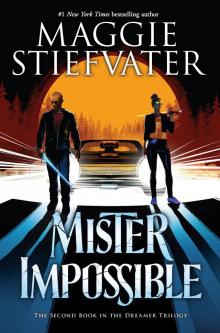 Mister Impossible
Mister Impossible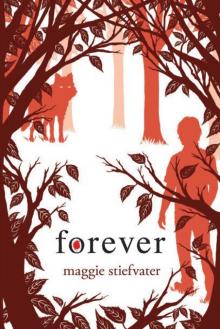 Wolves of Mercy Falls 03 - Forever
Wolves of Mercy Falls 03 - Forever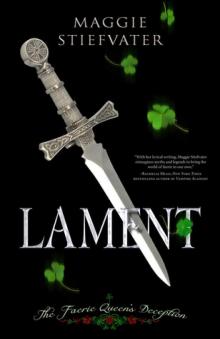 Lament
Lament![Maggie Stiefvater - [Wolves of Mercy Falls 02] Read online](http://i1.bookreadfree.com/i1/04/04/maggie_stiefvater_-_wolves_of_mercy_falls_02_preview.jpg) Maggie Stiefvater - [Wolves of Mercy Falls 02]
Maggie Stiefvater - [Wolves of Mercy Falls 02]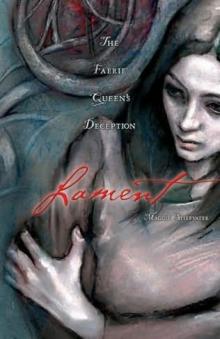 Lament: The Faerie Queen's Deception
Lament: The Faerie Queen's Deception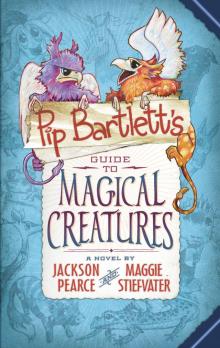 Pip Bartlett's Guide to Magical Creatures
Pip Bartlett's Guide to Magical Creatures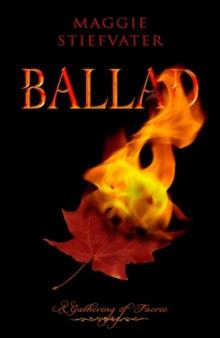 Ballad
Ballad